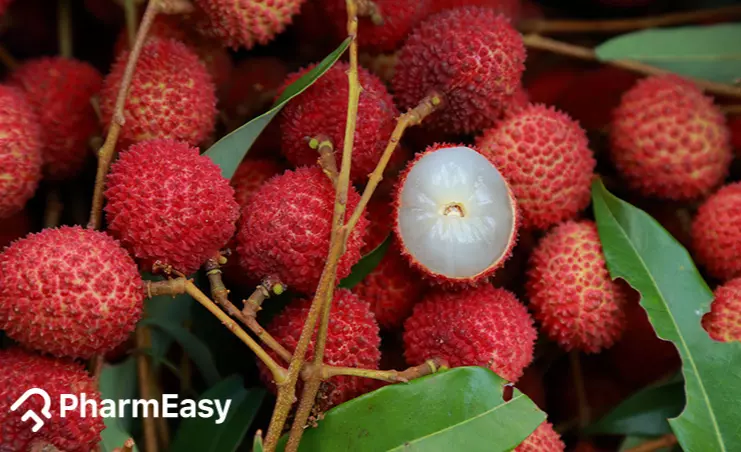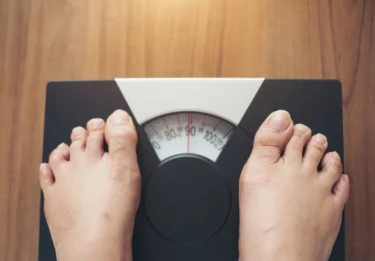Lychee: Uses, Benefits, Side Effects and More By Dr. Rajeev Singh
By Dr Rajeev Singh +2 more

Get,

to manage your symptom
Get your,


4 Cr+ families
benefitted

OTP sent to 9988776655



You’ve successfully subscribed to receive
doctor-approved tips on
Whatsapp

Get ready to feel your best.

Hi There,
Download the PharmEasy App now!!


Register to Avail the Offer
Send OTPBy continuing, you agree with our Privacy Policy and Terms and Conditions

Hi There,
Sign up on PharmEasy now!!
Trusted by 4 crore+ families

OTP sent to 9988776655



You have unlocked 25% off on medicines




Code: NU25
By Dr Rajeev Singh +2 more
Table of Contents
Lychee isn’t just a sweet and juicy tropical delight. It’s a powerhouse of nutrients with many health benefits! Whether you want glowing skin, a strong immune system, or better digestion, this fruit will help you. In this blog, we’ll read about its amazing uses, health perks, and a few things to watch out for so you can enjoy lychee to the fullest!
Friendly Reminder: The information shared here is for educational purposes only and the reader should consult a registered medical practitioner before implementing any changes to their health routine.

The uses of lychee can be attributed to its nutrients like polyphenols and polysaccharides, which may possess many health benefits.

High blood pressure and atherosclerosis (build-up of fats in the blood vessels) are some common conditions related to heart problems that affect people in their middle and old age. Eating lychee pulp might help relieve atherosclerosis and high blood pressure. The phenolic compounds in lychee pulp may help reduce blood pressure by stopping an angiotensin-converting enzyme. This enzyme is responsible for modulating blood pressure[1].
In animal studies, Lychee pulp could reduce low-density lipoprotein cholesterol (bad cholesterol) and enhance high-density lipoprotein cholesterol (good cholesterol) levels. However, you should consult your healthcare provider if you have a heart condition.

Lychee might show brain-protective benefits, as indicated by several lab studies[1]. Lychee seed extract could help with Alzheimer’s disease due to its potential effect on brain damage in an animal trial. The saponin compounds in lychee seed extract may also improve cognitive functions[7]. Lychee seed extract might help with Alzheimer’s[4], but more studies are needed to verify the safety and toxicological aspects. Also, if you are facing problems related to brain functions, please reach out to your doctor.

Lychee seed extract might be helpful for obesity[1]. Obesity can also lead to high lipid levels in the blood and make you prone to other health risks. Lychee pulp extract could also help control obesity during a trial[3]. The pancreatic lipase enzyme is an enzyme that helps digest fats. Stopping the pancreatic lipase enzyme may help with managing obesity. Lychee seed extract contains a protein that could hinder pancreatic lipase enzymes. However, if you wish to lose or manage weight, consulting a dietician or doctor before making any diet changes is recommended.

The liver is an essential organ responsible for detoxification and regulation of the metabolism of nutrients. Polyphenols present in lychee extract may reduce the extent of liver damage[2]. Long-term and excessive usage of alcohol can lead to the accumulation of fats. Polyphenols might also prevent alcoholic fatty liver disease[6], characterised by excessive accumulation of fats in the liver. However, if you have any liver problems, consulting a doctor before consuming any fruit or herb is recommended as using herbal remedies without consulting your doctor may worsen your condition.

Immunity is an essential physiological function of the human body. Our immunity protects the body from pathogens and maintains overall health. Compounds like polysaccharides and flavonoids present in lychee may have immunomodulatory benefits. Both dried and fresh fruits of lychee may modify the functioning of the immune system[1].

Excessive production of free radicals in the body can lead to conditions like atherosclerosis and cancer. Antioxidants can protect the body from free radicals and may help prevent the development of chronic diseases. Lychee contains polyphenols and polysaccharides in abundance[2]. These compounds possess potent antioxidant activity, which may help with the damage caused by free radicals[1]. However, these studies are incomplete in confirming these claims.
Lychee is a sweet fruit that can be enjoyed fresh. It is also available in the form of juices and dried fruits.
You must consult a doctor before taking lychee or any herbal supplements. Do not discontinue or replace an ongoing medicine treatment with an ayurvedic/herbal preparation without consulting a competent doctor.
Consuming lychee in excessive amounts may lead to side effects, but in rare cases. Some people may develop adverse reactions like:
If you notice these side effects, contact your doctor for treatment.
Also Read: Jowar: Uses, Benefits, Side Effects By Dr. Smita Barode
Lychee is known to lower blood glucose levels. Therefore, people taking drugs that lower blood sugar, such as insulin, should exercise caution while eating lychee.
Taking lychee with certain drugs can increase the risk of bleeding. These drugs include aspirin, warfarin, heparin, clopidogrel, ibuprofen, and naproxen.
Lychee Can Also Interact with Drugs Like:
Also Read: 8 Health Benefits Of Cucumber That You Should Know
From supporting heart health and boosting immunity to enhancing skin health, lychee offers multiple benefits when consumed in moderation. However, like any other fruit, it’s essential to enjoy it mindfully, considering its natural sugar content and potential side effects. Whether you eat it fresh, blend it into smoothies, or add it to sweet dishes, lychee can be a delicious and healthy addition to your diet. Enjoy this juicy superfruit and its many benefits!
Also Read: Papaya (Papita): Uses, Benefits, Side Effects and More!
Lychee has a sweet and floral flavour with a hint of tartness. Its taste is often compared to a blend of grape and pear, with a slightly musky aroma. The flesh is juicy and delicate, making it a refreshing and exotic fruit.
Yes, lychee contains natural sugar, which contributes to its sweet taste. On average, a single lychee fruit has about 1.5 grams of sugar, and a cup of lychee contains approximately 29 grams of sugar.
Yes, lychee is rich in vitamin C. One cup of fresh lychee provides over 100% of the recommended daily take. It is a good source of this essential nutrient, which supports immune function[5], skin health, and overall wellness.
Yes, lychees contain potassium. A serving of fresh lychee provides moderate potassium, which is essential for maintaining proper muscle, nerve, and fluid balance in the body[8].
Lychee can make you sick if consumed in large quantities, especially on an empty stomach, due to the presence of hypoglycin A and methylene cyclopropyl glycine (MCPG), which can cause a sudden drop in blood sugar levels. Additionally, eating unripe or lychees contaminated with pesticides can have adverse effects. It is generally safe to consume lychees in moderation as part of a balanced diet.
No, lychee seeds should not be eaten. They contain toxic compounds, such as saponins, which can be harmful if ingested. The seeds are not edible and should be discarded, while the fruit’s juicy flesh is safe and nutritious.
Babies can eat lychee, but it should be introduced once they are at leas one year old to reduce the risk of choking and potential allergic reactions. Always ensure the fruit is peeled, deseeded, and cut into small, manageable pieces.
1. Zhao L, Wang K, Wang K, Zhu J, Hu Z. Nutrient components, health benefits, and safety of litchi (Litchi chinensis Sonn.): A review. Comprehensive Reviews in Food Science and Food Safety. 2020 Jul 1;19(4):2139–63. Available from: https://onlinelibrary.wiley.com/doi/full/10.1111/1541-4337.12590
2. Kilari EK, Putta S. Biological and Phytopharmacological Descriptions of Litchi Chinensis. Pharmacognosy Reviews. 2016 Jan 1;10(19):60. Available from: https://www.ncbi.nlm.nih.gov/pmc/articles/PMC4791990/
3. Zhao L, Wang K, Wang K, Zhu J, Hu Z. Nutrient components, health benefits, and safety of litchi (Litchi chinensis Sonn.): A review. Comprehensive Reviews in Food Science and Food Safety. 2020 Jun 18 [cited 2025 Feb 25]. Available from: https://pubmed.ncbi.nlm.nih.gov/33337091/
4. Hamid M, Mansoor S, Amber S, Zahid S. A quantitative meta-analysis of vitamin C in the pathophysiology of Alzheimer’s disease. Frontiers in Aging Neuroscience. 2022 Sep 7 [cited 2025 Feb 25]. Available from: https://www.frontiersin.org/journals/aging-neuroscience/articles/10.3389/fnagi.2022.970263/full
5. Office of Dietary Supplements. Vitamin C. Office of Dietary Supplements. 2023 [cited 2025 Feb 25]. Available from: https://ods.od.nih.gov/factsheets/VitaminC-HealthProfessional/
6. Jinato T, Chayanupatkul M, Dissayabutra T, Chutaputti A, Tangkijvanich P, Chuaypen N. Litchi-derived polyphenol alleviates liver steatosis and gut dysbiosis in patients with non-alcoholic fatty liver disease: A randomized double-blinded, placebo-controlled study. Nutrients. 2022 Jul 16 [cited 2025 Feb 25]. Available from: https://pmc.ncbi.nlm.nih.gov/articles/PMC9319370/
7. Wang X, Wu J, Yu C, Tang Y, Liu J, Chen H, et al. Lychee seed saponins improve cognitive function and prevent neuronal injury via inhibiting neuronal apoptosis in a rat model of Alzheimer’s disease. Nutrients. 2017 Feb 4 [cited 2025 Feb 25]. Available from: https://pmc.ncbi.nlm.nih.gov/articles/PMC5331536/
8. What are the health benefits of Lychee (Litchi) fruit? ResearchGate. 2023 [cited 2025 Feb 25]. Available from: https://www.researchgate.net/post/What_are_the_health_benefits_of_Lychee_Litchi_fruit
Disclaimer: The information provided here is for educational/awareness purposes only and is not intended to be a substitute for medical treatment by a healthcare professional and should not be relied upon to diagnose or treat any medical condition. The reader should consult a registered medical practitioner to determine the appropriateness of the information and before consuming any medication. PharmEasy does not provide any guarantee or warranty (express or implied) regarding the accuracy, adequacy, completeness, legality, reliability or usefulness of the information; and disclaims any liability arising thereof.
Comments

Leave your comment...
You may also like
Comments